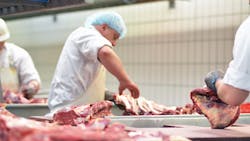Sincerely Stefanie: Meat Industry Employees are Treated Like the Product They Process
If there’s any industry that’s been serving up the biggest plate of excuses for its egregious workplace safety efforts, it’s the meat processing industry.
It’s no surprise that grocery stores across the nation are limiting the amount of meat consumers purchase as the supply chain crumbles. Workers are entering environments that already are implicitly dangerous, or to quote Chinese-owned processor Smithfield Foods Inc., “The inherent nature of meat processing, which is labor intensive, assembly-line style production, makes social distancing particularly challenging.”
This does not excuse the industry giants’ past transgressions when it comes to ensuring workers are safe and healthy. The fear of losing a limb or dying on the job is now compounded with concerns that workers will contract the novel coronavirus.
President Donald J. Trump recently invoked the Defense Production Act requiring meat and poultry producers across the United States to remain open during the COVID-19 outbreak, saying, “Such closures threaten the continued functioning of the national meat and poultry supply chain, undermining critical infrastructure during the national emergency. ”
His executive order states that plant closures of larger facilities are “inconsistent” with the guidance issued by the Centers for Disease Control and Prevention (CDC) and OSHA and potentially could cause devastating disruption. But are the lives of workers truly more important than a “disruption”?
A recent EHS Today article by Ryan Secard examines a federal lawsuit filed against Smithfield Foods that alleges the company’s Milan, Mo., plant failed to provide adequate protective equipment and even incentivized workers to come to work by offering a $500 bonus for employees who didn’t miss a shift between April 1 and May 1, which included sick leave.
A Smithfield Foods representative stated the claim was “without factual or legal merit,” and that “the company has been explicitly instructing employees not to report to work if they are sick and that they will be paid.”
Considering that the three largest meat producers in the country —Smithfield Foods, Tyson and JBS USA — have all been forced to close plants due to the coronavirus or related workforce problems, I’m skeptical that these companies have been giving their employees any sort of respect, dignity or the tiniest amount of effort toward compliance since they existed.
In a Senate hearing on May 12, Dr. Anthony Fauci drove home the point, saying, “It would seem that if you want to keep things like packing plants open, that you really have to provide the optimum degree of protection for the workers involved, the ability to allow them to go to work safely, and if and when individuals get infected, to immediately be able to get them out and give them the proper care.”
He then proclaimed, “When you’re calling upon people to perform essential services, you really have almost a moral responsibility to make sure they are well-taken care of and protected. That’s not an official proclamation, that’s just me speaking as a physician and as a human being.”
There’s no excuse that an average of 27 workers a day suffer work-related amputations or hospitalizations, according to a 2017 report from the National Employment Law Project (NELP).
There’s no excuse that the poultry industry as a whole has the 12th highest number of severe injuries of all industries reporting, ranking above auto, steel and other high-hazard industries.
There’s no excuse that Cargill, Tyson and JBS/Pilgrim’s Pride rank within the top 15 companies for severe injuries in the United States.
The National Chicken Council even responded to NELP’s findings in that report, saying the organization was “cherry-picking” data to advance the organization’s efforts. That response doesn’t dispute the integrity of the data. It only deflects from the notion that meat processors have failed in their duties to keep workers safe in an environment even they admit has “challenges.” And now, this very neglect for proactive measures is affecting the nation’s food supply.
Next time you’re at the grocery store and see those purchasing limits, don’t solely blame a virus for the supply chain issues. Instead, remember the workers who lost their limbs and lives so you could put dinner on the table.
I would even suggest that maybe it’s time we reduce our meat consumption in an effort to stand with other human beings who deserve to not live in fear while working in these dangerous environments.
At the very least, it’s time to call for action and enact the legislation and measures needed to change the way the industry treats its employees: like a piece of meat.
